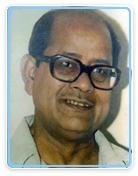 Remembering Sri. Rabindranath Roy should not be a mere ritual. The memory should be tapped as a source of inspiration for a constant striving for excellence and creativity to sustain humanistic action above the torpor of dailiness.
Remembering Sri. Rabindranath Roy should not be a mere ritual. The memory should be tapped as a source of inspiration for a constant striving for excellence and creativity to sustain humanistic action above the torpor of dailiness.
Sri. Roy made a phenomental contribution to the field of health education as a dedicated scientist with his uncanny practical wisdom he successfully masterminded the family welfare programmes in the Indian Railways —A largest organized sector in Asia.
Mr. Roy was a great friend of extension educators. He continually strove to ameliorate their status and working conditions. He did not do so as some may erroneously believe due to any revolutionary leanings. He did so because of his strong credo that a strong extension education base was indispensable for any viable health education programme. He had repeatedly stressed that there could not be any progress in the rural upliftment without a proper population control and the basis of proper progress in this is an integrated educational programme on family welfare. It may sound naïve but it is absolutely true especially in India where about 80% of the population lives in villages. Sh. Rabindranath Roy was borne in the year 1933 at Dhaka. The capital of the erstwhile East Bengal (now in Bagladesh.) in a family of business. Right from the beginning he has been a staunch supporter of rural upliftment programmes.
Sri. Roy was initiated in the field of extension education when he himself joined as a lecturer in the West-Bengal Government Rural Training Centre for extension educators. He was one of the first batch of Health Educationists to do his post graduate diploma in Health Education from All India Institute of Public Health from where he passed out in flying colours. With his exceptional administrative ability, dynamic action and poetic vision —- he brought to bear upon an educator’s work an indelible person impression. He ruthlessly simplified the arcane intricacies of extension educational systems to enable it to grow roots at the grass root level. He was also involved in the 1st pilot research programme on leprosy wherein he developed such a skill and ability that he caught the attention of the father of Health Education Dr. V. Ramakrishnan who was the then Regional Head of the World Health Organisation.
From the year 1969 till death Sh. Roy was incharge of the Health Education Programme in the Indian Railways wherein he looked after the Training, evaluation and education of family welfare programmes. He initiated many research programmes during his tenure in the Railways for instance with his indigenous techniques he initiated a study of knowledge, Attitude and Practice of Family Planning Programme in the Railways Board (popularly known as the KAP Study.) for senior officers. This was well received and also commended. Another of his study which got a commendation from the estimates committee of the Parliament was the Birth Rate Study.
He also developed an intensive in-study training of the field staff like extension educators, field workers and staff nurses to enable them to initiate effective programmes to bring down the birth rate.
Even during his last days he had conducted an intensive training programme traveling through the length and breadth of this vast country. Probably an institution into what lay in store made him inject a new vigour and strength to the programme. The success of his effort is already evident in the ongoing achievements of the institution for which he strived so much.
The award has been initiated with a view to fulfill his unfinished dreams in the field of Rural Health and it is hoped that the recipients will not stop with this one paper of excellence but will continue to strive to do better and develop better ways of extension education as the person, on whose behalf this award is initiated.
